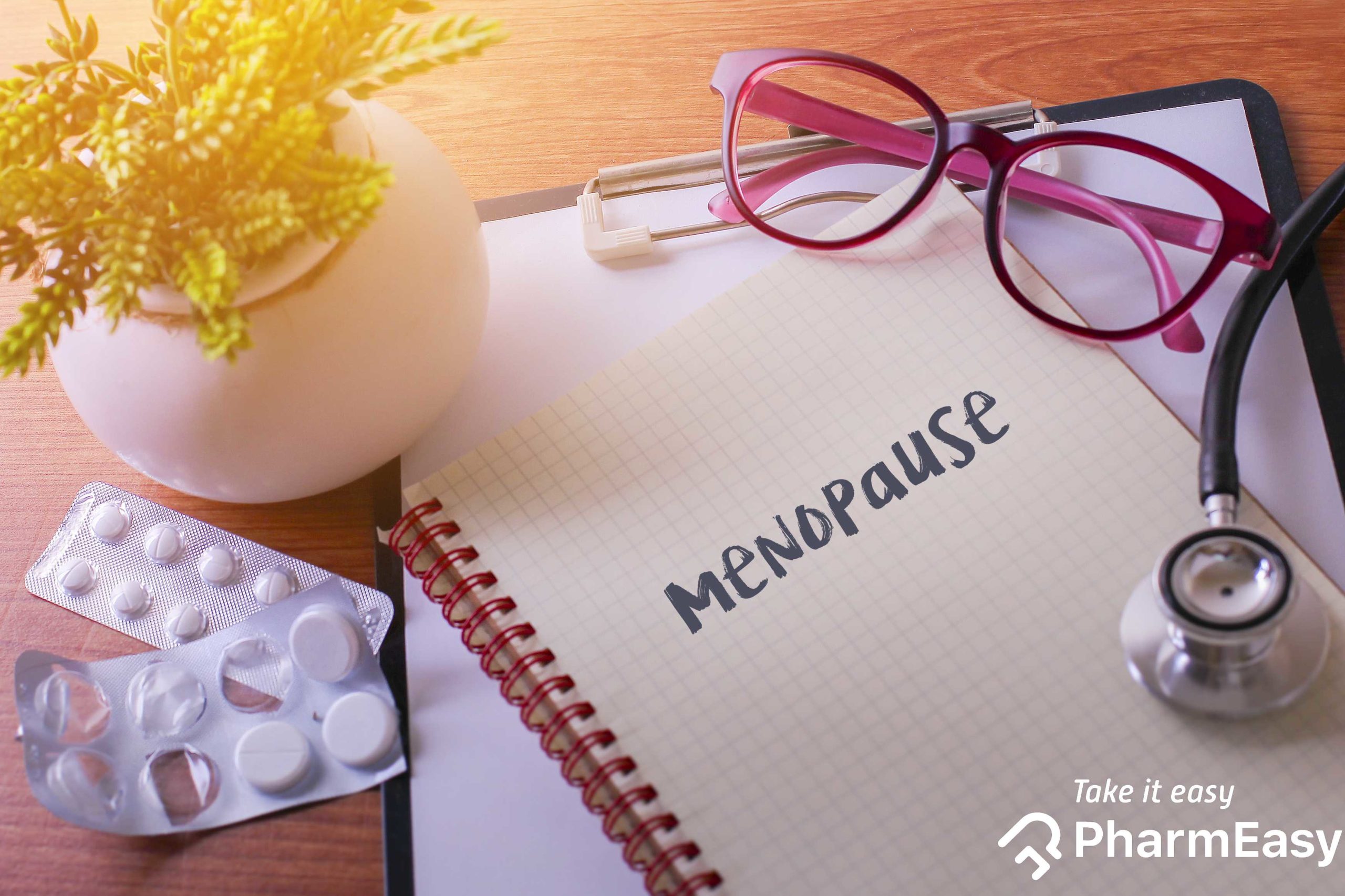8 Healthy Foods To Deal With Menopause Symptoms
By Riddhi Parmar +2 more

Download PharmEasy App




Register to Avail the Offer
Send OTPBy continuing, you agree with our Privacy Policy and Terms and Conditions
By Riddhi Parmar +2 more

Are you excited about your fabulous 50?
A Fabulous 50 years of life gives women various memories to plan their retirement life peacefully. But for some women, this menopausal time can be difficult.
Menopause is a crucial phase of women’s life after puberty and the menstrual phase. During perimenopause and menopause, the changes in hormones can cause or aggravate midlife crisis for women. It usually occurs between 45 to 55 years of age.
Every woman has to face this ”change of life” pattern in their life, sooner or later. Menopausal symptoms vary with every woman. Common symptoms include hot flashes, night sweats, vaginal dryness, weight gain around the middle, sleep disturbances and mood changes. However, some women go through menopause with no real symptoms. It is confirmed 12 months post the final period. The Oestrogen and Progesterone levels start to decline, which can interfere with the health of women.
It is time for women to take care of their bodies by choosing healthy lifestyle choices. Eating well and being physically active will make this midlife transition easier. Here we have enlisted some foods to help make the transition easier.
Table of Contents
The decline in oestrogen and progestin levels can lead to an imbalance in the levels of calcium and vitamin D in the body. It may increase the risk of recurrent fractures in women. Dairy products such as milk, yoghurt and cheese contain a high amount of calcium, phosphorus, potassium, vitamin D and vitamin K, which are essential for bone health.
One study of peri- and post-menopausal women found calcium and vitamin D rich foods help to reduce early menopause risk by 17%. It may help to deal with some symptoms of menopause.
Green vegetables such as broccoli, kale and cabbage are a powerhouse of vitamins, minerals, fibres and antioxidants. They might help in dropping oestrogen levels during menopause.
One study found broccoli has a positive impact on oestrogen levels-increasing the oestrogen responsible for reducing breast cancer risk.
Whole grains include brown rice and barley is rich in dietary fibres, vitamin B. Whole grains may boost metabolism and help regulate energy levels. Adding whole grains to a diet can help to lower cholesterol, blood glucose and prevent constipation.
Oatmeal is the healthiest breakfast to keep your energy levels balanced. It contains menopause friendly food items like berries, yoghurt and green vegetables. They are rich in healthy carbs and dietary fibres that can help prevent diabetes, high cholesterol, weight gain, inflammation and constipation.
Fatty fish such as salmon and mackerel are a good source of omega-3 fatty acids and vitamin D, essential during menopause. Research suggests that omega-3 fatty acids help to reduce night sweats and breast cancer risk. Vitamin D also helps reduce the risk of early menopause.
Also read: Boosting your Health: A Comprehensive Guide on How to Increase Estrogen
Beans and legumes contain plant-based proteins to help delay the onset of early menopause. It helps to prolong female reproductive function.
Soybeans contain a compound named-phytoestrogen. It is a plant-based compound that may act as a weak oestrogen. It helps reduce menopause symptoms and healthier bones. Servings per day of beans, nuts, peas, soy and tofu may have a protective effect on ovarian function besides reducing inflammation.
Seeds such as flaxseeds, sesame seeds, and linseeds are rich in phytoestrogens. It helps to balance the hormones, particularly in menopause.
Dryness is the most common symptom of menopause that can be recovered by drinking plenty of water. Dryness of cells, skin and mucous membrane may cause the decline of estrogen level. Drinking 2-3 litres of water can help flush the toxins from the body and reduce bloating caused by hormonal imbalances.
Soy products are believed to be effective in easing some menopausal symptoms, such as hot flashes and nocturnal sweats. Studies suggest that soy products include phytoestrogens, a substance comparable to oestrogen, they may help reduce the symptoms of menopause.
Dr. Siddharth Gupta, B.A.M.S, M.D (Ayu)
Did you know vegetables may improve bone health in addition to helping with weight management? Cauliflower is an example of a vegetable you should incorporate into your diet to help you keep a healthy weight and lessen the frequency and intensity of hot flashes.
Dr. Rajeev Singh, BAMS
Various factors are linked with menopausal syndrome and its treatment part. Eating right and healthy food is one of them. A healthy diet and perfect exercise can help to ease the pain of menopause. A balanced diet high in vegetables, whole grains, high-quality protein and dairy products may reduce menopause symptoms. You may want to limit added sugars, processed carbs, alcohol, caffeine and high-salt or spicy foods as well. The simple changes in your diet and habit can keep you healthy and happy.
Read more about 8 Incredible Foods That Are Good For Your Heart
Comments